Mentors All Around
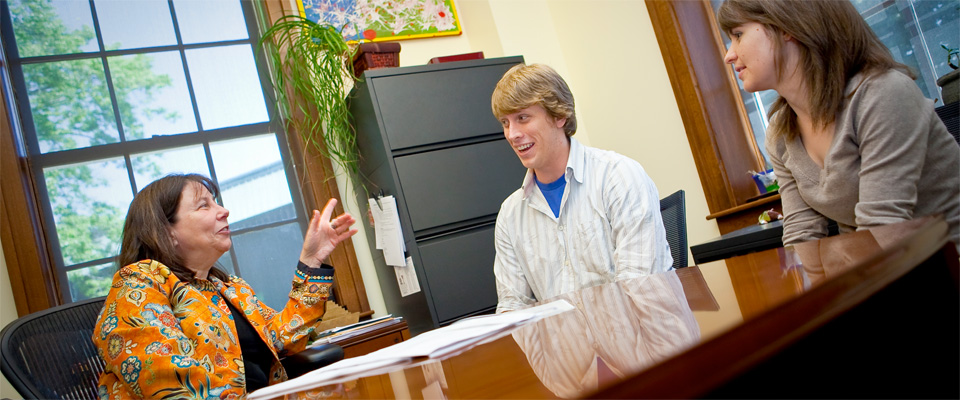
At Lafayette, mentoring relationships are a way of life — and can lead to lifelong relationships. Throughout campus, in nearby coffee shops and restaurants, and sometimes much farther away, Lafayette students can be found in conversation with faculty and staff members. Some students are seeking academic help or personal guidance. Some want to be challenged.
They find thoughtful answers, helpful advice, a new project related to their interests, and affirmation from those who have experience in the matter at hand and know them well enough to understand what step may be helpful in their process of self-discovery.
Mentoring is central to the College’s mission to provide an “environment that fosters the free exchange of ideas, nurture inquiring minds, and integrate intellectual, social, and personal growth.”
Here, 15 faculty and staff members describe diverse approaches to mentoring and what the experience means to them and their students.
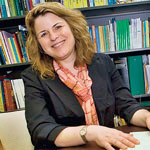 SUSAN AVERETT, Dana Professor of Economics
SUSAN AVERETT, Dana Professor of Economics
I am an enthusiastic person, and this is reflected in my approach to mentoring. I strive to provide positive support and guidance, especially when things go wrong for a student, such as a failed exam or an avenue in thesis research that is not panning out as planned. I firmly believe that we are architects of our own success and not victims of our circumstances. My goal is to remind my students that success or failure is in their hands and that they have to — and can — make things happen. Since hard work is the key to success, I model that work ethic with all the students I mentor. Students I have mentored have presented advanced papers at conferences, collected complex data, studied at prestigious graduate schools, and often become friends and colleagues of mine.
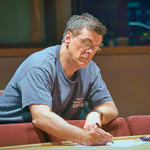 MICHAEL O’NEILL, associate professor of English and director of theater
MICHAEL O’NEILL, associate professor of English and director of theater
One of the great benefits of heading a small theater program is that I am able to interact with so many of Lafayette’s most creative students. Whether I am rehearsing actors, helping young playwrights and screenwriters through the painful process of revision, or advising honors students about the staging choices they make while directing their plays, mentoring is always an essential element of my teaching. Mentoring keeps me on my toes because no set pedagogical strategy applies to every one-on-one teaching moment. I’m always improvising, challenging myself, and learning anew what I thought I had mastered a long time ago.
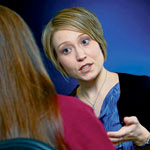 LAUREN SEFCIK ANDERSON ’04, assistant professor of chemical and biomolecular engineering
LAUREN SEFCIK ANDERSON ’04, assistant professor of chemical and biomolecular engineering
Hanging on my desk is this quotation from author and talk-radio host David Viscott, M.D.: “Your ultimate goal in life is to become your best self. Your immediate goal is to get on the path that will lead you there.” I use this advice personally for focus and perspective, and it describes the approach I take to mentoring. For me, being a mentor is first about helping students identify this “path” and then about helping them get started in ways that include providing them with opportunities to participate in research, pointing them toward an internship, or identifying courses in their areas of interest. Above all, it is important for a mentor to be a good listener.
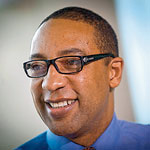 GEORGE BRIGHT, associate director of athletics
GEORGE BRIGHT, associate director of athletics
I’ve heard it before. It usually starts with three soft knocks, followed by a melodic, “You got a minute?” A student, speaking with passion, says, “I need your advice.” There’s nothing structured, no formal agenda. The student is usually looking for advice on a life choice and wants me to help make a decision. Most students already know the answer, but I help pull it from them and set boundaries. What I say might not be what they want to hear, but it’s what they need to hear. The advice comes with a personal challenge. Sometimes, too, it’s not a student coming to me, but me going to a student. I might notice something wrong or different and say, “Hey, you got a minute?” It means a lot to me to be able to do that. I’ve gotten calls from someone I had talked to four or five years earlier, saying thanks for the five minutes, the coffee, the time you spent with me.
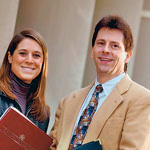 JOHN SHAW, associate professor of psychology and assistant department head
JOHN SHAW, associate professor of psychology and assistant department head
Mentoring at Lafayette assumes many forms for me, from working one-on-one with psychology majors on honors theses to personally connecting with dozens of students in my largest class, Introduction to Psychological Science. In both settings, the key component of a successful mentoring relationship is a shared responsibility for learning. I strive to give my students two gifts: an unconditional belief that they can exceed their own expectations and an enduring trust that they will take ownership of their learning and maturation. High expectations beget superior performance. As a mentor, I serve primarily as a guide, maybe prodding a bit here and there, but mostly just keeping each student headed in the right direction. And when we get there? It is equally rewarding and fulfilling for us both.
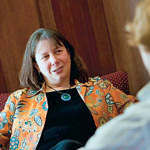 JULIA GOLDBERG, associate dean of the College
JULIA GOLDBERG, associate dean of the College
When a student enters my office, the mentorship process begins with a conversation designed to tease out interests, values, passions, and dreams. Figuring out who my students are, where they are going, and how their various interests and activities come together is the best part of my day! I get to know students in ways that few on campus do and to maintain those relationships after graduation. That is an honor I wouldn’t exchange for anything. Helping students submit a scholarship application also involves mentorship – the kind that is concerned with communication and critical thinking skills, where every word, every sentence, every paragraph are subject to intense scrutiny and analysis. I become their advocate: encouraging, challenging, provoking, and basking in their accomplishments. I am so proud of students such as the Posse Scholar who spent a year studying on a Fulbright grant, a former Goldwater Scholar who was awarded a graduate assistantship to study at Cambridge, and a pre-med student who discovered a passion for public health while applying for a Truman Scholarship.
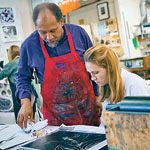 CURLEE HOLTON, Roth Professor of Art and department head
CURLEE HOLTON, Roth Professor of Art and department head
A fundamental principle of good teaching is that the teacher/mentor has the courage to intellectually confront a student with concepts and approaches to learning that might undermine perspectives and opinions that student previously held. The mentor must prod the student to think in different ways in an effort to illuminate new knowledge or alternative ways of thinking. The mentor must be sensitive to the process through which the student apprehends new information and how that information must find a relevant relationship to the student’s previous knowledge and intellectual experiences. If I can guide a student to a greater degree of mental agility and intellectual strength, then I have served an important purpose. If I can bring students to a greater sensitivity about who they are and expand their capacity for insightful thinking and self-confidence, I believe they will contribute to making a richer, more responsible world. As teachers and mentors perhaps our greatest role is one of advocacy towards a more thoughtful, closely scrutinized reality.
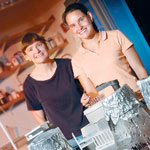 YVONNE GINDT, associate professor of chemistry
YVONNE GINDT, associate professor of chemistry
One of the best reasons for me to teach and conduct research at Lafayette is that I get to work, often one-on-one, with talented, enthusiastic students. I can do my most effective (and satisfying) teaching while working as a scientist. Meanwhile, the students I’m mentoring get to tackle challenging problems using both tools from the classroom and new skills specific to the problem. Wonderful tangibles can result. For example, our work is often published in the top chemistry journals. The students often find their research and publishing experience helps opens doors in industry, graduate school, and medical school. In addition, one-on-one research can be a transforming event, helping students discover new passions. They may realize that they want to go down an entirely new path and find that their experience has helped them gain the confidence to succeed.
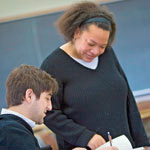 CHAWNE KIMBER, associate professor of mathematics
CHAWNE KIMBER, associate professor of mathematics
In college, I benefited from many interactions with two professors who generously gave their time and advice to help me plan my educational path and teach me how to think deeply — about both mathematics and many of society’s toughest problems. Decades later, I am still in regular contact with these role models, and I see my mentoring activities as an effort to give back. At Lafayette I meet students every day who have great potential to be leaders in my courses, in their majors, on campus, and ultimately in their careers. It is thrilling to help them develop the academic skills necessary to meet their goals and endeavor to increase their potential as citizens. I enjoy the challenge of figuring out how best to serve each unique student, and I treasure the lifelong friendships we form.
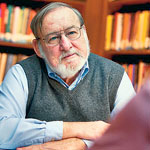 JAMES LENNERTZ, associate professor of government and law
JAMES LENNERTZ, associate professor of government and law
As a young geezer I sang clever tunes and waited for my young students to echo them. As I began to learn what mattered, I offered interesting melodies and asked my young colleagues to sing harmonious counterpoint. Lately I fi nd myself listening more as my young artists create music within and out of my silences. Mentoring resides in the enduring relationships of my vocation: teaching and learning, friendship and professionalism, knowledge and wisdom. I mentor, we mentor, I am mentored.
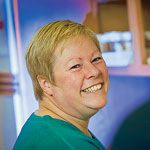 ELAINE REYNOLDS, associate professor of biology
ELAINE REYNOLDS, associate professor of biology
I came to Lafayette to teach and mentor students. For me, it broadens the impact I can have in the world. I can do the “world’s work” myself, and I can mentor students. They, in turn, can take what they learn from me, mix it with their own ideas and creativity, and do the world’s work themselves. My role as mentor has been the most rewarding aspect of my life, and my students’ response to my efforts has been astounding. I am fortunate to count some of my former students among my friends. It has been wonderful to get to know them, to watch them succeed both at Lafayette and in the world. These relationships are the core of my strength and the strength of our institution.
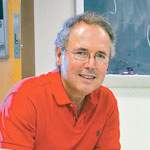 ISMAIL JOUNY, Dana Professor of Electrical and Computer Engineering
ISMAIL JOUNY, Dana Professor of Electrical and Computer Engineering
For me, mentoring starts the week before my students’ first classes, when I emphasize good study habits, encourage them to seek both academic and personal help when they need it, and explain the importance of academic honesty guidelines. By senior year, the relationship has evolved to discussions of life after Lafayette, including finding a job or selecting and applying to graduate schools. I also guide students’ honors theses or senior project work, help them choose senior electives, encourage them to establish a sustainable life-long learning aptitude, and advise them to be mindful of environmental, political, legal, entrepreneurial, sustainability, and safety issues in their careers. Mentoring is demanding, highly rewarding, and beneficial to both professor and student. At Lafayette, mentoring both inside and outside the classroom makes a real difference and leads to significant, everlasting, positive results.
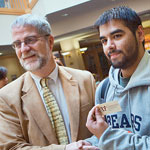 JOHN COLATCH, director of religious and spiritual life and associate dean of intercultural development
JOHN COLATCH, director of religious and spiritual life and associate dean of intercultural development
Young adults observe, contemplate, and question. They can recognize insincerity from a mile away. I have had to think carefully about what it means to serve in a profession in which those with whom I work watch my actions so closely, and I have asked myself if I would want to have someone like me as a guide or adviser. I had a wonderful mentor in college. His door was always open to his students, and that is the firm rule for me: my door is always open. If I provide a safe place where students feel welcome to ask questions or simply talk about what they are going through, I can assist them in working toward specific academic, professional, or spiritual goals. I have offered guidance in all of those areas over the years, and my hospitality has proven to be a gift that keeps giving. It is my hope that students will use the experience of working with me as a springboard to connect with people who they may not have regarded as friends and colleagues before.
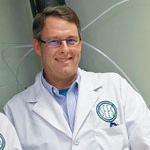 ARTHUR KNEY, associate professor of civil and environmental engineering and department head
ARTHUR KNEY, associate professor of civil and environmental engineering and department head
Outside the classroom is where learning really takes hold, where students take ownership of their knowledge, where they have the opportunity to test theories using the tools and ideas provided in the classroom, to make mistakes, and, sometimes, believe it or not, to break things. When these out-of-classroom experiences are guided by a mentor, someone who is able to provide feedback, encouragement, and constructive criticism, students grow exponentially. Just as in the classroom, students are individuals and require different levels of interaction. Good mentors know and understand their students on a more personal level than would be expected in the classroom. I believe this is what makes Lafayette special. We are a community of teachers and scholars, and we are pretty good at bringing the two roles together through individualized mentoring.
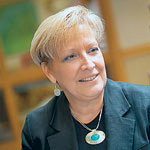 PAM BREWER, associate dean of students and director of student life programs
PAM BREWER, associate dean of students and director of student life programs
Mentoring is the hallmark of an accomplished student-life professional, and it is the passion that keeps me working long hours after more than 30 years in higher education. What makes mentoring different from teaching, instructing, training, or advising is the depth, mutuality, and longevity of the relationship between student and mentor. Students who desire mentoring may identify shared interests, values, or goals in a professional from whom they aspire to learn or gain support. If the connection is mutual, the relationship may span all four years of college – or may last a lifetime. I regularly receive emails from alumni I have mentored, and we continue to impact each others’ lives both professionally and personally many years after graduation.
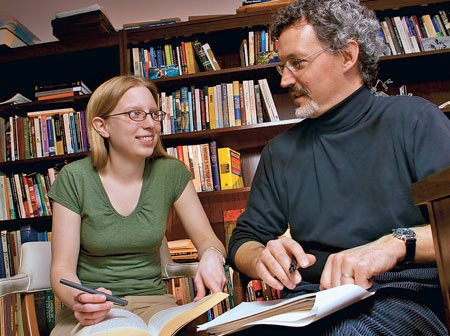
Elizabeth Ponder ’04 (left), who holds a Ph.D. in microbiology and immunology from Stanford’s School of Medicine, is manager of scientific affairs for BIO Ventures for Global Health. One of her mentors was William Bissell, associate professor of anthropology, who advised her capstone project for an A.B. in cultural biomedicine. She also worked with Bernard Fried, professor emeritus of biology, and Joseph Sherma, professor emeritus of chemistry, and earned a B.S. degree in biochemistry.